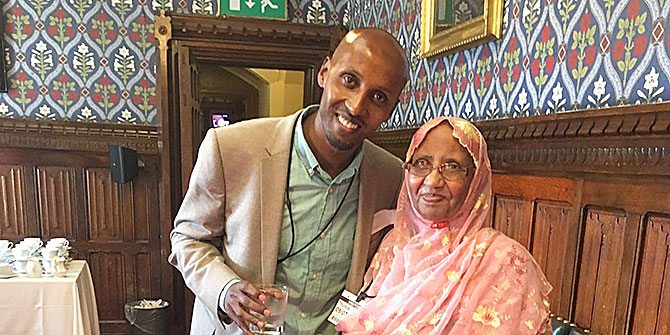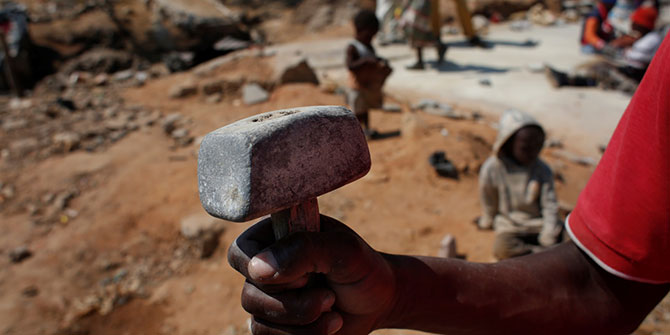While Northern policy discourse and the national development policies of African countries focus on the economic value of returnee migration, the contributions in Africa’s Return Migrants: The New Developers? emphasise the role of social capital in managing a successful return, says Constance Smith.
In December 2016, the British media made much of the story that the newly-elected President of the Gambia, Adama Barrow, had previously worked as a security guard in a north London branch of Argos. Conveniently skipping over the fact that this was essentially a student job supporting his studies in property management, the headlines were almost unanimous in their incredulity: “Former Argos security guard from London estate defeats African dictator to become PRESIDENT of Gambia” read the Daily Mail. Unsurprisingly, his experience working at Argos – which was twenty years ago – was not exactly what led him to victory. Since his return to the Gambia in 2006, Barrow has become a leading business figure in the real estate sector. Prior to the 2016 elections, he was nominated as the leader of a coalition of seven opposition parties united in their endeavour to finally overthrow Yahya Jammeh.
The media angle on Barrow reveals much about ambiguous British attitudes towards returning migrants. On the one hand, the insinuation that the state of politics in Africa is so dismal that even an Argos security guard can become a president, on the other, a conceit hinting that even brief exposure to the superior systems and structures of a developed country can equip Africans with skills that will get them a long way back home. What none of the coverage discussed, but which was undoubtedly crucial to Barrow’s success, was the political, social and economic circumstances of the Gambia, and that it was Barrow’s capacity to effectively negotiate this context that enabled him to thrive on his return.
A new edited collection, Africa’s Return Migrants, seeks to turn the spotlight on this return experience. As the editors observe in their introduction, this is a particularly timely subject given the growing political enthusiasm for ‘voluntary’ return migration, and the emergence of policies intended to facilitate a ‘successful return’. In this discourse, returnees are cast as ‘agents of development’ who will bring back capital, skills and attitudes gained in the developed North for the betterment of their ‘home’ countries. By having a foot in both worlds, returnees are imagined as brokers who can mediate between government ideas about successful development on the one hand, and cultural values and local practices of their country of origin on the other.
This volume argues that, in practice, the ‘agents of development’ argument overestimates both migrants’ opportunities for economic gain, knowledge transfer and cultural integration while abroad, and the translatability of any such capital on their return. In many European countries, African migrants are subject to multiple exclusions and remain overrepresented in unskilled and low-paying jobs. Furthermore, as highlighted here in seven ethnographic case studies, managing a successful return is predicated on migrants’ own capacities to negotiate local contexts – including political frameworks, public infrastructure, legislation and social networks – as much as experience and capital gained overseas.
The contrasts between policy and reality are examined in several chapters. Lisa Åkesson’s research in Cape Verde reveals that many returnees lack the necessary social ties to gatekeepers such as politicians and customs officers and are therefore unable to meet government expectations to contribute to economic development. In Senegal, where return migration is encouraged through national policy, Giulia Sinatti shows how, contrary to policy assumptions, locally-held resources are as crucial to successful business outcomes as those acquired abroad. Return to the Democratic Republic of Congo, Maria Eriksson Baaz argues, is notable not so much for the privileged access it enables as for the way in which many returnees adopt the same livelihood and investment strategies as stayers. Meanwhile, Katarzyna Grabska problematises the notion that modernity and development are associated with the global North through her case study of young women’s experiences returning to South Sudan from refugee camps in Kenya.

Photo credit: John Perivolaris via Flickr (http://bit.ly/2skpWgP) CC BY-NC-ND 2.0
While Northern neoliberal discourses and the national development policies of African countries may focus on the economic value of returnee migration, the contributions in this volume emphasise the role of social capital in managing a successful return. Nauja Kleist suggests that for Ghanaian elite returnees, mastery of local ‘rules of the field’ and strong translocal networks are preconditions for managing a successful return. Tove Hegli Sagmo argues that for returnees in turbulent Burundi, local connections and trust-building are just as vital as financial capital. But building strong social networks is not easy, as Laura Hammond discovered in Somaliland, where some local residents perceive diaspora returnees to be taking advantage of increased peace and security at the expense of those who did not leave.
In an increasingly globalised yet unequal world, the relationship of the African diaspora to African development is complex and heterogeneous. While the influence of remittances has received considerable scholarly attention in recent years, there has been much less focus on the physical return of African migrants, whether temporary or permanent. This incisive collection of case studies open up this space, demonstrating with careful empirical examples that the experience of return migration is much more challenging than the policy landscape assumes.
To do so, the essays emphasise the position of return migrants in a larger political economy of development, rather than dwelling on the everyday personal and emotional challenges of returnee life. This is certainly a crucial theme, but as Madeline Wong has shown in her work with highly skilled returnees in Ghana, the two can not easily be separated. Resentment from other colleagues, gendered expectations and different workplace cultures can be frustrations with both personal and professional consequences. One area for future research will be to examine how the self-imagining and self-making of returnees interact with larger political and economic contexts to influence the notion of a ‘successful return’. What is clear, however, is that the personal resourcefulness, strong social networks and favourable local conditions needed far exceed what can be acquired through a brief stint at Argos.
Dr Constance Smith (@connieruthsmith) is a Postdoctoral Research Associate at the Institute for Global Prosperity, UCL
The views expressed in this post are those of the author and in no way reflect those of the Africa at LSE blog or the London School of Economics and Political Science.





